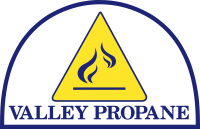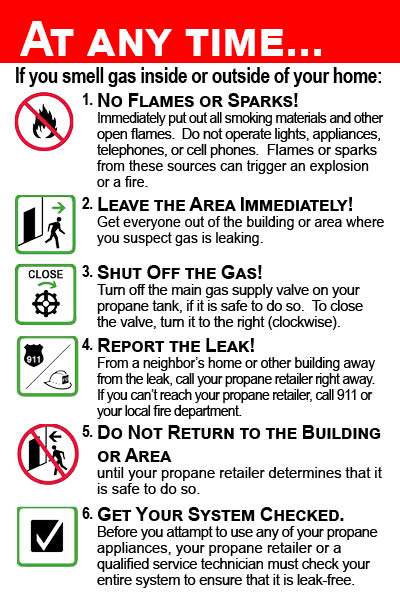Follow these before, during, and after instructions to keep your family safe in the event of extreme heat.
If extremely hot weather is predicted, listen to your local authorities, or television and radio stations, for instructions on the appropriate course of action to take. Since this type of weather can be accompanied by days—sometimes weeks—of drought-like conditions, there are also steps you can take to keep your propane system working properly:
Follow these general safety rules
Extreme heat can contribute to power outages, wildfires, or other events requiring you to take additional safety measures. To help reduce the potential for injury or death, there are general safety rules you should observe at all times:
Be Prepared For Periods Of Extreme Heat Before They Happen
- Make sure your propane tank (and any other cylinders) is painted with a light-reflecting color. This will help keep the temperature level of the propane down.
- Know how and where to shut off the outdoor propane supply and indoor propane appliances.
- MAKE SURE THAT YOU AND YOUR FAMILY KNOW WHAT PROPANE SMELLS LIKE. Propane has a strong, unpleasant smell like rotten eggs, a skunk’s spray, or a dead animal.
- NEVER store or place a propane cylinder indoors or in an enclosed area such as a basement, garage, shed, or tent.
- It is recommended that you consider installing a carbon monoxide(CO) detector listed by Underwriters Laboratories (UL) on every level of your home. Be sure to follow the manufacturer’s instructions regarding installation, location, and maintenance.
- Propane gas detectors provide an additional measure of security. It is recommended that you consider installing one or more propane gas detectors listed by UL. Be sure to follow the manufacturer’s instructions regarding installation, location, and maintenance.
- Have a list of instructions on how to turn off electricity, propane, and water. Review suggested preparations for conditions such as extreme heat with your propane retailer as well as other utility suppliers. Advise them of any special needs you may have.
- Create an emergency preparedness plan and review it regularly with your family in order to keep them safe during a potential disaster.
If extremely hot weather is predicted, listen to your local authorities, or television and radio stations, for instructions on the appropriate course of action to take. Since this type of weather can be accompanied by days—sometimes weeks—of drought-like conditions, there are also steps you can take to keep your propane system working properly:
- Make sure the area within 10 feet of your propane tank and your propane grill is clear of flammable materials. Remove any debris that is combustible or easily ignited, including leaves, brush, any vegetation, and rags.
- Cool down your outdoor propane tank by spraying it with a garden hose. By doing so, you can help lower the gas pressure and elevated temperature levels inside the tank. This reduces the possibility of the system releasing excess gas through the pressure-relief valve, its built-in safety feature.
Follow these general safety rules
Extreme heat can contribute to power outages, wildfires, or other events requiring you to take additional safety measures. To help reduce the potential for injury or death, there are general safety rules you should observe at all times:
- NEVER use outdoor propane appliances indoors or in enclosed areas. This could result in CO poisoning or death. These include
outdoor portable heaters, barbecue grills, and portable generators. Only use appliances indoors that are designed and approved for indoor use. - NEVER store or place a propane cylinder indoors or in an enclosed area such as a basement, garage, shed, or tent.
- DO NOT UNDER ANY CIRCUMSTANCES TRY TO MODIFY OR REPAIR VALVES, REGULATORS, OR OTHER APPLIANCE PARTS.
- NEVER turn on a light switch, use any power source, or inspect your household appliances while standing in water. This can result in electrocution.
- DO inspect your propane appliances for water or other damage, if it is safe to do so. If the appliances have electric components and have been exposed to water, they can create a fire hazard.
If you suspect any of your propane appliances, equipment, or vehicles have been under water or they have been damaged, or you
have turned off your gas supply:
- DO schedule a time for a qualified service technician to perform a complete inspection of your propane system. The technician can also perform a leak test on the system and re-light your pilot lights.
- DO NOT use or operate appliances, equipment, or vehicles, or turn on the gas supply, until your system has been inspected by a qualified service technician.

